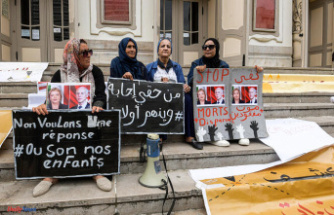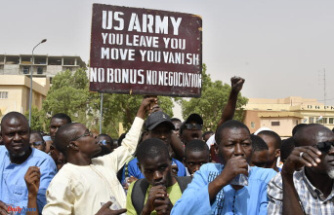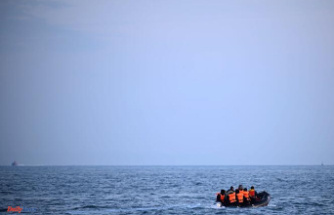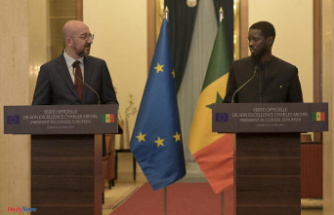As in Madrid, where a purple tide has swept through the city, women around the world are demonstrating on Wednesday to defend their rights, flouted in various places on the planet.
"For me, it's very important (to be there) because my grandmothers fought for us to have certain freedoms," 52-year-old cook Mariam Ferradas told AFP in the Madrid procession. .
At least 27,000 women, almost all dressed in purple, the color of feminism, marched through the Spanish capital, according to official figures, to cries of "My body, my life!" or "The street and the night are also ours!"
"We always have in mind our comrades from Iran or Ukrainian women," added Mariam.
Taliban in power in Afghanistan, repression of the protest provoked in Iran by the death of Mahsa Amini, questioning of the right to abortion or feminicides: the reasons for mobilization for women's rights are numerous throughout the world.
Elsewhere in Europe and Asia, thousands of women gathered, sometimes defying the authorities, such as in Istanbul where they celebrated a "feminist night march", whistling and singing under the watchful eye of the police who had banned any protest in Taksim Square.
In France, the protest was placed under the sign of the fight against pension reform, accused of being unfair to women. "Pensions, wages, women are angry!", Chanted the Parisian procession in particular.
In Pakistan, a very conservative and patriarchal country, women have also taken to the streets by the thousands despite attempts by the authorities to prevent some of their marches, where often taboo subjects such as divorce, sexual harassment or menstruation are discussed.
"We are no longer going to sit in silence. This is our day, this is our time," said Rabail Akhtar, a teacher in Lahore. “Why are they so afraid of women standing up for their rights?” said Soheila Afzal, a graphic designer.
In Afghanistan, "the most repressive country in the world with regard to women's rights", according to Rosa Otunbaïeva, head of the United Nations Assistance Mission in Afghanistan (Manua), there were about twenty of them demonstrating in Kabul, a found AFP.
Since the return to power of the Taliban in August 2021, "women and girls have been erased from public life" in this country, deplored Monday the Secretary General of the United Nations Antonio Guterres who, more generally, expressed concern about the fact that "gender equality is moving further and further away" in the world.
"At the current rate, (the organization) UN Women sets it at 300 years from now," he said.
In a speech read to thousands of delegates gathered for several days at UN headquarters in New York for the Commission on the Status of Women (CSW), Mr. Guterres also stressed on Wednesday that "violence in packs and online is a direct attack on democracy that effectively censors women, harasses them and blunts girls' ambition to become leaders."
In Ukraine, President Volodymyr Zelensky wanted to pay tribute to the women "who have sacrificed their lives" since the start of the Russian invasion a year ago. His Russian counterpart Vladimir Putin celebrated women who "fulfill their duty", especially in the military.
In a symbolic and unprecedented step, the European Union on Tuesday adopted sanctions against individuals responsible for violations of women's rights in six countries, including the Taliban Minister of Higher Education Neda Mohammad Nadeem, while Afghan women no longer have the right to go to university or secondary education.
It was imitated on Wednesday by the United Kingdom, which froze the assets and banned several individuals and entities responsible for violence against women in Iran, Syria, South Sudan and the Central African Republic.
In Latin America, the mobilization from north to south has been placed under the sign of the fight against feminicide.
A scourge in Brazil in particular, where more than 1,400 were recorded last year, or one every six hours, a record leading Wednesday President Lula to announce measures to fight against this "intolerable" violence.
Same slogan in Mexico, where 969 feminicides were recorded last year, in a large parade on the Zocalo, Mexico City's main square, under the slogan "Not a single woman murdered!". In Colombia, the number of femicides increased from 182 in 2020 to 614 last year.
In Venezuela, the women's protest in Caracas focused on the demand for "a living wage" in the context of accelerating inflation.
In Peru, mired in a political crisis, the slogans were directed against the country's first female president, Dina Boluarte, accused by indigenous demonstrators of being responsible for the deaths of dozens of civilians: "we have nothing to celebrate in this day because we mourn the loss of so many young people," Ana Isabel Aguilar, an Aymara from the Puno region (south), told AFP.
In Cuba, for lack of being able to march freely, independent feminist organizations have called for a "virtual demonstration" on social networks.
Feminists are also particularly mobilizing around the world to defend the right to abortion, challenged in particular in the United States by the decision of the Supreme Court in June to revoke the "Roe v. Wade" judgment of 1973 guaranteeing this right.
In France, President Emmanuel Macron announced the presentation of a bill "in the coming months" to include voluntary termination of pregnancy (IVG) in the Constitution.
bur-mig-mg-lab/fjb/rr/lpa
09/03/2023 01:45:05 - Madrid (AFP) - © 2023 AFP












